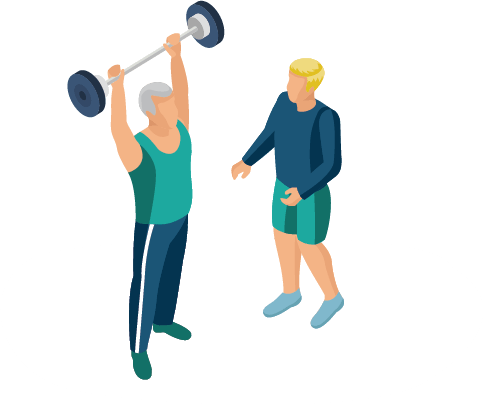
WHO WE HELP
SENIORS


Are you a resident of Arizona who’s 62+ years old?
If so, you may qualify for a reverse mortgage, also known as a Home Equity Conversion Mortgage (HECM). The HECM is a federally-administered loan designed to help qualified homeowners enhance their cash flow during retirement. Private jumbo reverse mortgages may also be available in your area for higher-valued properties as well as younger borrowers, that do not meet the qualifications set forth by the FHA and HUD. Call me to discuss this product in further detail as each lender has their own unique features.
What are the requirements to be eligible for a Reverse Mortgage?
To qualify, you must be within six months of turning 62 years old, own your home as your primary residence, and have enough equity to pay off any outstanding balances. There are also minimum income and credit standards that are needed to be met, although they are likely not as hard as you think. Further protection is obtained by attending a required counseling session from an independent agency that is approved through HUD prior to incurring and costs associated with the loan (except for the counseling session). This is the first step after receiving your proposal and deciding if you want to proceed.
With a reverse mortgage, you will be able to access a portion of the value of your home without having to make traditional monthly mortgage payments. You’ve worked hard on this home, now let it work hard for you.
Do I own my home?
You will retain ownership and title to your home in the same way as a traditional “forward” mortgage. Repayment is not due until the home is sold, the last borrower passes away, or the home is no longer your primary residence. Keep in mind that borrowers must maintain the home in a good and safe condition, pay the property taxes, and maintain homeowner's insurance coverage in order to avoid the loan becoming due and payable. Another point worth noting, you will have the peace of mind that your home is insured through the Federal Housing Administration (FHA) and that it is a non-recourse loan, meaning that the bank can never come after your estate for any shortfalls.
So what happens when I pass away or go into a nursing home?
At this point, when the reverse mortgage needs to be repaid, the family members can decide to keep the house by paying the remaining loan balance or 95% of the home's appraised value (used when the home is worth less than the property’s worth).
Will I be required to pay taxes on the money I receive?
The proceeds of a reverse mortgage are not subject to income taxation. In fact, they can be used to offset other taxable events that occur during the liquidation of retirement assets. I recommend that we sit down in order to discuss this further, especially with your financial planner and/or CPA. Borrowers should seek all of their tax advice from a qualified professional in order to understand how the funds may affect programs that are needs-based from the government, such as Medicaid and Medicare.
ADULT CHILDREN
Will the bank seize my parents’ home?
As long as your parents adhere to the loan guidelines, they will continue to own and live in their home. If they fail to pay necessary property costs such as taxes or homeowner’s insurance, and also maintain their home in good condition, the loan may become due and payable. Similar to a traditional mortgage, your parents will retain ownership of their home and title as long as they meet the loan guidelines and requirements.
What happens if my parents move into a senior care facility?
A reverse mortgage becomes due and payable when the last borrower permanently moves out of their home. If your parents move into a senior care facility, sell the home, pass away, or move in with family, the loan will become due and payable.
What if the loan balance exceeds the value of the home?
The Home Equity Conversion Mortgage (HECM) is a non-recourse loan, this means that the loan is secured by the home only. The mortgage insurance premium that is paid to HUD, protects them, or the estate, from any shortfall between the amount owed to the lender and the value of the home at the time it is due and payable. Great news is that if the heirs wish to retain the home, they can choose to pay the lesser of the loan balance or 95% of the home's appraised value, less any closing costs and real estate commissions.
Are there limitations on how my parents can utilize their funds?
Not at all, your parents can use the money as they see fit.
Let’s look at some examples my clients have used:
Pay off debts, including their home, in order to maximize their retirement income
Home improvements such as landscaping or even necessary elderly upgrades such as railings and wheelchair needs
Vacations
To purchase an RV or cabin (now you have TWO homes gaining equity with NO principal and interest payment!)
Replace an aging vehicle
Help with college tuition for their grandchildren
Help their grandchildren or children with a down payment on their first home
The options are really endless. They just need to make sure that they make the necessary payments toward property's taxes, insurance, HOA (if applicable), and keep the home maintained as well as keeping it as their primary residence.
Are there other siblings and what about medical care?
Adult children who are interested in learning more about how a reverse mortgage could help their parents should contact myself, or another trusted professional, for more information. Some questions to consider include concerns from other siblings regarding inheriting the home or equity, if there are financial resources available to help with medical and living expenses, and what the parents' wishes are regarding staying home when medical care is needed for an extended period.
How will a reverse mortgage affect our inheritance?
This is a super tricky question that has a number of outcomes as well as a plethora of benefits which can affect a seniors estate. This is also one of those questions that no one wants to ask, but is a concern for both the heirs as well as seniors.
The very nature of a HECM loan is that the senior will not be making the payments and thus the interest and annual MIP will accrue and be added to the loan balance. This is offset partially, if not entirely, by the appreciation of the homes value over time. However, as we all know, this is not guaranteed and the loan could out pace the appreciated value and result in less equity.
Now, I would like to address the previous point. The seniors have been able to live in their home with no principal and interest payment resulting in a more comfortable life on the income they have coming in. There are also benefits that can be realized by utilizing their reverse mortgage to pull from instead of their annuities, 401k, IRA, and other assets tied to stock market when there is a down market. This could result in much higher gains in the long run. Feel free to reach out to me in order to discuss the “coordinated withdrawal strategy” and how it can work hand-in-hand with your financial planner.


FINANCIAL ADVISORS,
CPA, AND OTHER TRUSTED
ADVISORS
Financial Limitations:
While the proceeds from a reverse mortgage will not affect one’s social security income, it could affect certain government assistance such as Medicaid. So we ask that one consults with their attorney, financial planners, and accountants to be fully aware of any possible implications.
Please note...
It is important to address that a reverse mortgage loan may not be suitable for every individual. With the permission of your client, we can provide you with detailed loan scenarios to assist in making an informed decision that is in your client's best interest. We believe in transparency and will inform our clients of both the advantages and disadvantages of a HECM loan.
DRAWBACKS
Potential Consequences:
If the borrower fails to meet ongoing loan obligations such as paying the property's taxes, insurance and other necessary property charges…then you could face foreclosure.
It may affect eligibility for needs-based programs like Medicaid.
The loan balance increases while the equity decreases over time. While this is offset be the home appreciation, nothing can be guaranteed.
Itemizing tax deductions could be affected as the deduction for home interest may be eliminated if no interest is paid out of pocket. However, paying upfront fees and the accruing interest may make the homeowner deduction available in the year the interest is paid. This presents a great opportunity to offset Roth IRA conversions and other taxable events.
Costs and Requirements:
The borrower must also maintain the property per HUD requirements.
Closing costs and insurance apply, so borrowers should plan on staying in the home for more than a couple of years.
BENEFITS TO YOUR CLIENTELE
Financial :
Allows access to a portion of the home's value without requiring monthly mortgage payments.
Pay off existing mortgages, thus freeing up monthly cash flow and reducing the draw needed on assets under management.
Provides funds for long-term care insurance, in-home health care and/or medical expenses.
Can provide a source of cash flow while allowing borrowers to recover from market losses with the “coordinated withdrawal strategy”.
Social:
Enhance a senior's quality of life while reducing financial concerns at retirement.
Allows seniors to age in place while maintaining their independence.
Borrowers must maintain the home in accordance to HUD requirements.




